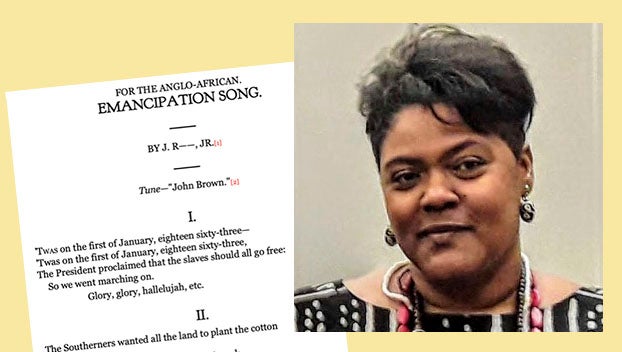Washington woman discovers history of enslaved ancestor
Published 7:01 am Friday, June 17, 2022
|
Getting your Trinity Audio player ready...
|
By CLARK CURTIS / For the Washington Daily News
Up until recently, John Randolph Jr., a native of Washington, was a complete mystery to his great-great-granddaughter, Naomi A. Randolph Hwesuhunu and her family.
Naomi is part of the 7th generation of Randolphs born and raised in Washington. She knew Randolph had lived with his wife and children in New Bern in the 1860s. But no records could be found of his time in Washington. That was until Naomi received a Facebook message in December of 2020 from Leesa Jones, director of the Washington Waterfront Underground Railroad Museum, enquiring if she was related to a John Randolph Jr.
The correspondence became the key to unlocking a part of her family history that had been hidden over time.
“I can’t thank Leesa enough for reaching out to me and my family,” Naomi said. “With her help, my great-great-grandfather was no longer a mystery. He became real and tangible. Our entire family was able to fill a void in our lives and it became a deep part of my story and the rest of our family.”
The interaction provided a glimpse into the story of John Randolph Jr., and the part he played in the rich history of Washington and the surrounding area.
Randolph was born into slavery near Washington in 1827. In the early to mid 1860s, he, his wife Della Redmond Randolph, and their children picked up and “moved” to New Bern to begin anew. Given the time period, Naomi feels “moved” is more than likely synonymous with escaped.
In New Bern they connected with the emancipated community of African Americans, becoming the third such couple to be legally married there.
Randolph was a carpenter by trade. He helped with the construction of the African-American Presbyterian Church, helped to construct one of the first one-room school houses and took part in the building of the first African-American Masonic lodge in 1870. John and Della also became acquaintances with known abolitionist Abraham Galloway, and soon became involved in the abolitionist movement. Randolph was known as a gifted writer and orator.
At the time of the signing of the Emancipation Proclamation by President Lincoln in 1863, Randolph penned a song/poem titled, “For the Anglo-African. Emancipation Song.”
Randolph’s daughter, Fannie, would later perform the song at the first Emancipation/Freedom Day parade in Washington in 1864. It soon appeared in many abolitionist publications and was used as a rallying cry for the idea of freedom and emancipation for African Americans across the country.
“When I read and hear the tone of his writing,” Naomi said, “it is the same tone I have seen in the writing of other family members, and myself as well. His words are so beautiful and sacred to me. To finally see and read them has become one of the greatest gifts for me during this long journey.”
On June 18, Naomi will share her newly found gift during the Greater Beaufort County Historic Juneteenth Celebration. There she will read the song/poem on the steps of the First Presbyterian Church, the site where the Emancipation Proclamation was first read in Washington in January of 1863.
The day will be significant for Namoi in many ways, she said. It marks the first time that Juneteenth will be recognized as a federal holiday. But, she will also be a voice for a part of her history and the history of Washington that has laid dormant for so long.
“For me, Juneteenth means all of our work has not been in vain” Naomi said. “His work, his sacrifices, and those who walked in solidarity with my great-great-grandparents, from family members to others, was not in vain. In the words of Frederick Douglas, ‘there can be no crops without the plowing of the field.’”
Naomi said she is honored to have been asked to share a glimpse into the life of her great-great-grandfather, John Randolph Jr., a once enslaved man who, along with his wife and children, went on to touch the lives of people in Washington and across the state of North Carolina.
“We, my generation and beyond, have a responsibility to remember, honor, uplift, and walk in those footsteps to the best of our ability,” Naomi said.
As her father once told her, “To whom is given much, much is required.”
“I have been given a lot.,” Naomi said. “I have been blessed and I have to show up. I have to be of service and support with the sweat off my brow or the coins in my pocket, so as to uplift the community.”
For more information about the Greater Beaufort County Historic Juneteenth Celebration visit the Washington Waterfront Underground Railroad Museum FB page.






